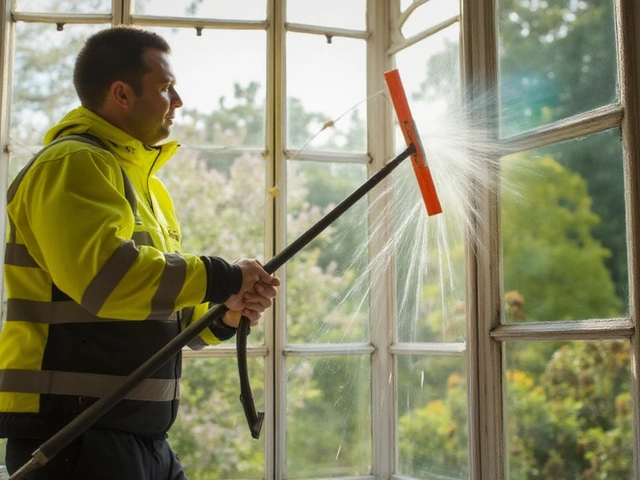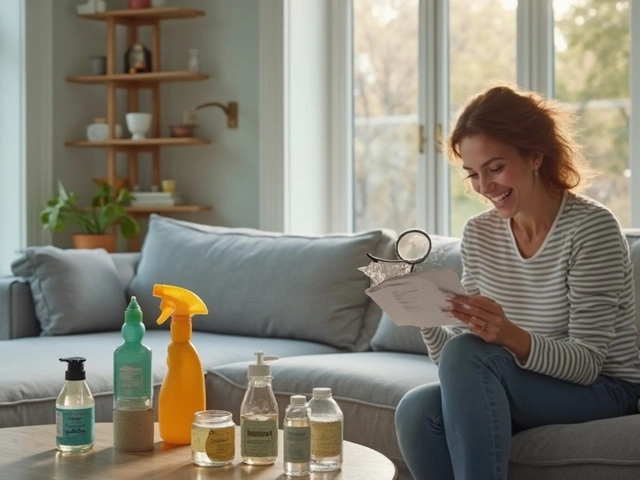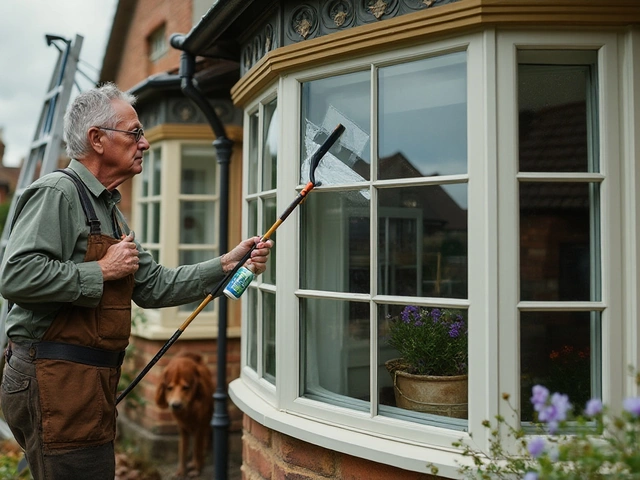In today's world, we are increasingly turning towards more sustainable and gentle ways to maintain our homes. One such method involves using natural disinfectants, straying away from harsh and often environmentally damaging chemicals.
Natural disinfectants are not only powerful but are also kinder to our planet and our health. You may already have some of these ingredients like vinegar, baking soda, and essential oils tucked away in your pantry. Their effectiveness can surprise you, and they come without the hefty price tags of commercial cleaners.
Through easy-to-make recipes and simple application tips, you can introduce natural disinfectants into your cleaning routine effortlessly. Embrace a cleaner, greener home while contributing positively to the environment.
- Understanding Natural Disinfectants
- Common Ingredients and Their Uses
- DIY Recipes for Natural Home Cleaning
- Benefits of Switching to Eco-Friendly Products
Understanding Natural Disinfectants
The concept of using natural substances as disinfectants is not new, but it has gained traction recently due to a surge in eco-consciousness and health awareness. Natural disinfectants provide a potent solution for cleaning without the adverse effects associated with many conventional chemical cleaners. Unlike their synthetic counterparts, which can often leave harmful residues threatening both health and the environment, natural disinfectants offer a safe alternative. They harness the inherent properties of various natural substances, utilizing their innate ability to combat germs. Household items like vinegar and baking soda provide compelling examples of this ability, having been used for generations in effective home cleaning practices.
The primary appeal of natural disinfectants lies in their composition. They are derived from environmental-friendly sources, making them biodegradable and non-toxic. These attributes drastically reduce the ecological footprint left by regular cleaning routines. Essential oils, such as tea tree or lavender, have risen to prominence not only for their pleasant aromas but also their antimicrobial properties. In fact, a study published in the "Journal of Applied Microbiology" highlighted tea tree oil’s effectiveness against common household bacteria. Though lacking the instant gratification of chemical-based disinfectants, these natural alternatives offer a slower but equally effective cleaning strength, particularly when integrated regularly into a household cleaning regimen. This aligns with the increasing consumer demand for products that prioritize safety and sustainability.
Transitioning to eco-friendly cleaning practices offers many rewards, from protecting sensitive skin to preserving indoor air quality. With a growing availability of sustainable products on the market, consumers find themselves at a crossroads between convenience and responsibility. By embracing organic disinfectants, households contribute to a broader cultural shift toward reducing chemical exposure and environmental damage. There is a distinct charm in knowing that every sweep of clean not only sanitizes a personal space but also nurtures the very earth that sustains human life. To better understand the impact of these natural choices, let’s dive deeper into the ingredients that form the cornerstone of these green cleaning solutions.
Breaking Down the Ingredients
Natural disinfectants often make ingenious use of commonplace items, elevating them from mere pantry staples to powerful cleaning agents. Vinegar, with its acidic properties, can dissolve mineral deposits, grease, and grime, making it a versatile cleaner. When combined with the abrasive texture of baking soda, it becomes especially effective against stubborn stains and clogs, a testament to the earthy ingenuity that defines green cleaning. Essential oils enhance such solutions with their potent antibacterial properties. A few drops of eucalyptus or lemon oil not only amplify cleaning strength but also leave behind a refreshing and uplifting scent. These examples illustrate how effortless and advantageous it can be to swap traditional cleaners for their natural counterparts, ultimately paving a path toward a healthier lifestyle.
"Incorporating natural disinfectants is not only a nod to simpler times but also a vital step towards protecting our planet. These agents are not only effective but reflect our growing commitment to sustainable living," noted Dr. Eleanor Green, a leading environmental scientist.

Common Ingredients and Their Uses
The pursuit of a healthier and more sustainable lifestyle often begins right at home, particularly with eco-friendly cleaning. Venturing into the realm of natural cleaning supplies, you’ll find an array of effective ingredients readily available in your kitchen cabinet. One of the most common and potent natural disinfectants is white vinegar. Its acidity makes it a powerful bacteria killer and an excellent choice for breaking down grime and cutting through grease. Vinegar is especially useful in the kitchen, where greasy surfaces and food stains are prevalent challenges. Not only does it sanitize with ease, but its deodorizing properties also leave your kitchen smelling fresher.
Baking soda, another household staple, plays an incredible role as a natural scrub and deodorizer. When combined with water or vinegar, baking soda morphs into a strong, abrasive solution perfect for removing stubborn dirt build-up. It is especially effective in areas like bathrooms, where molds and mildews thrive. It can even help unclog drains when used with vinegar. An added perk is that its mildness ensures it won’t damage most surfaces, making it ideal for families concerned about toxic residue or irritation.
Essential oils bring a fragrant and therapeutic aspect to natural cleaning solutions. Oils such as tea tree, lavender, and lemon have natural antibacterial properties. They can be added to homemade cleaners to not only boost their cleaning power but also imbue the home with pleasant, calming scents. Tea tree oil is particularly notable for its antifungal prowess, often used in fighting mold and mildew. On the other hand, the refreshing scent of lemon oil makes it a favored choice for spaces like bathrooms and laundry rooms. A few drops go a long way in enhancing any green cleaning mixture.
"Our results suggest that essential oils can be a great alternative in cleaning products for their natural antimicrobial activities," says Dr. Susan A. Jones, a noted expert on using essential oils in household products.Hydrogen peroxide is often overlooked but stands as a robust defender against germs. It's ideal for bathroom and kitchen uses, capable of disinfecting countertops without leaving a trace of harmful residue. Its oxidation power effectively kills mold and mildew while simultaneously whitening surfaces. The gentle nature of hydrogen peroxide makes it a versatile ingredient for numerous cleaning applications while ensuring the safety of your environment.
To better illustrate its spectrum of uses, let's consider the balance of eco-friendly cleaning properties in a natural all-purpose cleaner:
| Ingredient | Primary Function |
|---|---|
| White Vinegar | Disinfects and deodorizers |
| Baking Soda | Scrubs and deodorizers |
| Tea Tree Oil | Antifungal |
| Hydrogen Peroxide | Sanitizes and whitens |
Switching to natural disinfectants not only supports sustainable practices but also simplifies cleaning routines significantly. You might be surprised to find how these unassuming ingredients from your pantry stand toe-to-toe with commercial sanitizers, paving the way for a cleaner and greener home environment.

DIY Recipes for Natural Home Cleaning
When it comes to maintaining a clean and healthy home, utilizing natural disinfectants can offer an impressive balance between efficacy and ecological care. Many of these eco-friendly cleaning methods rely on simple ingredients that can be found in most households, effectively turning kitchens into a hub of cleanliness rather than just culinary creativity. One of the pillars of natural cleaning is vinegar, known for its strong acetic acid content which makes it a potent tool against grime and germs without introducing harmful chemicals into our living spaces. This versatile ingredient can be used in its diluted form for wiping down kitchen surfaces, polishing bathroom tiles, or even freshening up laundry loads. The smell may be sharp at first, but it dissipates quickly, leaving behind nothing but cleanliness.
Baking soda, or sodium bicarbonate, partners wonderfully with vinegar to address more stubborn stains and odors. This friendly white powder is not only safe but highly effective due to its mild abrasive nature and ability to neutralize unpleasant scents. You can apply this ingredient directly onto surfaces requiring a deeper scrub or mix it with water to form a paste that tackles any persistently dirty nooks and crannies. For those looking to add a bit of fragrance to their cleaning regime, essential oils serve as an exquisite option. These concentrated plant extracts come in a variety of scents like lavender, tea tree, and eucalyptus, each presenting its own set of naturally disinfectant properties. Just a few drops can transform your homemade cleaning solutions into aromatic blends that uplift your spirits while you work. The oils are rich in potent compounds that often carry antibacterial, antiviral, and antifungal properties, ensuring that your efforts don't go unnoticed.
To make your DIY cleaning mixtures, you've got plenty of room for creativity. A simple recipe involves mixing equal parts of water and white vinegar in a spray bottle, then adding around ten to fifteen drops of your favorite essential oil for fragrance and additional cleaning power. This solution can be used to clean windows, counters, and even to mop floors. For tougher jobs, create a paste using half a cup of baking soda and a few tablespoons of water, adjust until you hit a spreadable consistency. Apply it directly to the area and scrub using a brush or cloth to lift and remove grime before rinsing thoroughly. Another delightful recipe combines two cups of water, a tablespoon of baking soda, two tablespoons of liquid Castile soap, and around fifteen drops of an essential oil in a spray bottle. This concoction works wonders on any surfaces, proving its prowess as a multifunctional cleaner.
Before diving into mixing and matching, it's crucial to remember some safety tips. Firstly, not all ingredients mix well, so it's best to avoid combining vinegar with hydrogen peroxide as it can produce harmful fumes. Also, while essential oils are wonderful additions, ensure they are stored and handled safely away from children and pets. Interestingly, a survey conducted by the American Cleaning Institute found that nearly 74% of consumers are interested in purchasing eco-friendly cleaning products, which is a testament to the growing awareness and demand for sustainable home care solutions. This encouraging trend is helping reduce the environmental impact of household cleaning, one natural disinfectant recipe at a time.

Benefits of Switching to Eco-Friendly Products
Choosing to shift towards eco-friendly cleaning products can have a significant impact on both personal well-being and environmental health. One of the key benefits is the reduction of harmful chemicals in your household. Conventional cleaners often contain substances that can be irritants, affecting your skin and respiratory health. By opting for natural alternatives, you are lessening the exposure to these potential toxins, creating a safer home environment for you and your loved ones.
Moreover, using natural disinfectants supports the health of our planet. Many traditional cleaning agents are not biodegradable, meaning they can persist in the environment long after they are used, contributing to pollution and harming ecosystems. In contrast, natural ingredients like vinegar and baking soda break down more easily and do not linger in soil or waterways, reducing the overall ecological footprint of your cleaning practices.
Another compelling advantage is the cost efficiency of natural solutions. Many natural cleaning agents are everyday items found in pantries, which can be significantly cheaper than specialized commercial products. This cost-saving aspect makes eco-friendly cleaning more accessible to a broader audience, promoting wider adoption and a shift towards sustainable living practices. Creating your own cleaning solutions at home can also be incredibly satisfying and empowering, allowing you to tailor the strength and scent of your cleaning agents to suit your specific needs.
Enhancing indoor air quality is another benefit worth noting. Many synthetic cleaners release volatile organic compounds (VOCs) that can degrade indoor air quality and contribute to health issues like headaches and dizziness. Natural products typically do not contain these compounds and, as such, help in maintaining a fresher, healthier indoor environment. A study by the Environmental Working Group highlighted that the air inside the average home can be up to 500 percent more polluted than the air outside, largely due to household cleaning products. By switching to natural options, you can drastically improve the air you breathe daily.
"The secret of change is to focus all your energy not on fighting the old, but on building the new." — Socrates
Finally, embracing green cleaning can set a positive example for future generations. It fosters a consciousness about the products we use and the impact they have on the world around us. Educating children and communities about the benefits of natural disinfectants encourages a collective effort towards sustainability, ensuring that the practice takes root and spreads. Thus, this simple change is not just beneficial for you personally but also contributes to a larger societal shift towards environmental stewardship.





